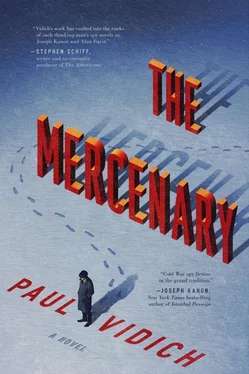“What if I don’t want to play anymore?”
“We’ll give you a pill to help you sleep.”
“This doll isn’t my type,” he said.
Olga smiled. “Pretend it is an action figure or an alien in disguise. I’ll tell you a story about how much fun it is to fool people into thinking you are one thing when you are really a different thing.”
Garin saw that Olga had her son’s attention.
The door opened, and a stocky conductor entered. He wore a dark blue uniform, a large leather belt across his chest, and the smugness of a minor official proud of his authority.
“Tickets.” He turned to Garin, who produced the fourth first-class ticket Petrov had bought. “You’re in the third-class car. I already sent you back. Are you a troublemaker?”
“He’s with us,” Petrov said. “He has a ticket.”
“He has two tickets. You can’t have two seats. It’s not permitted. We’re sold out. I need to report this.”
Petrov produced several rubles from his pocket and added to the amount until the conductor was satisfied.
“Don’t worry,” the conductor said. “You’re safe in this seat. Our patriotic soldiers deserve to be treated well.” He patted the child’s head. “Cute little girl you’ve got.”
* * *
KALUGA. THE FIRST stop on the Moscow main line south was two and a half hours into the journey. There was a large train station that was used for local traffic and passengers traveling to and from Moscow. The station was a two-story, rose-and-cream stucco building from tsarist times that sat astride the railbeds. Garin had risen from the compartment when he heard the conductor announce their approach.
He wasn’t surprised when he didn’t see Natalya among the small group waiting for the train. They boarded quickly, and when the five minutes allotted for the stop were up, the train lurched forward, and continued toward Uzhgorod.
“Well?” Petrov said.
“It is just us,” Garin replied.
“That’s better. We don’t need complications.” He gazed at Garin. “Somehow you look disappointed.”
“No.” He pointed to his face. “This is never what you think it is.”
“Be careful,” he said, and turned to his wife, who was alarmed at what she’d heard. “Don’t worry. Sometimes he doesn’t know that his humor is lost on people.”
It was a long train ride. Garin knew he would have to sleep, but he found it hard to put Natalya out of his thoughts. He believed that she might change her mind, drive her car, and join him as they had discussed. She knew the plan, had agreed on the town, and had reasons to leave, even if she claimed she would rather stay. There was the possibility that she could escape the Soviet Union on her own and suddenly appear in the West asking for asylum. And there was another possibility. She had been arrested, now in Lefortovo Prison, or already dead.
He didn’t dwell on the thought. She was gone from his life and that was the same as death—a type of death. The same as his wife. Garin took one last long pull on his cigarette and ground it into the arm’s ashtray. Fuck it . The curse slipped from his lips.
Early-morning darkness was upon them, and he knew he had to sleep. Just when he was drifting off, a baby somewhere began to cry in another compartment, and when the child quieted, he heard riotous singing of two troublemaking drunks who pounded on each compartment door as they made their way through the carriage, exciting angry howls from sleeping passengers, and the noise woke the infant, who started to cry again.
Garin turned in his seat, adjusted his head against the headrest, and made a determined effort to ignore the noise. Once inside the quiet of his mind, he again began to fret the details of the coming day.
Sometime in the middle of the night, he drifted off. It wasn’t sleep as much as it was the suspension of wakefulness. He was aware of things entering his consciousness. He was aware of sounds, alert to the change in the train’s rhythm. He heard the tapping of hammers as maintenance men tested the Krupp steel wheels for fractures. There was the explosive sound of air pressure slapping against their carriage as a high-speed train passed. He had wild dreams that he did his best to ignore.
* * *
DAWN CAME AS glowing warmth through the window. Garin was aware of bright sunlight on his face. He sat up and saw Petrov, Olga, and the boy still asleep. The boy lay across his mother’s lap. Petrov’s mouth was open, his head leaned back. A great exhaustion and the uncomfortable worry of the next day’s unknown kept them from stirring.
Garin looked out the window at the great steppes that disappeared to the far horizon. Then there was the restless rumble underneath as they crossed a trestle bridge over a surging river, and out the window he saw the beginnings of russet hills that glowed in the early-morning light. They had passed through Kiev, and now the landscape changed to fertile flatlands, scar, and ravine. They would be on the train all day, and half a second night, before ending the long journey.
Garin left the compartment for the passageway, lighting a Prima, which he drew on deeply. He gazed out the window at the passing landscape and contemplated the land of his father. He tried to imagine the man he had never met. It was at times like this that the American graft on his Russian heart gave him great pain.
The train made its slow, wending way south and west through terrain dotted with farm villages. He saw diesel-starved tractors with hoes being pulled by horses. A kind of serene stupidity came over him. The hours of travel had softened his face and brought him to a comfortable reckoning. He was lost in thought gazing at the passing landscape, and in the moment, he was a young boy again looking at the far horizon of his life, leaving behind the weary man living his future. The changing landscape and the train’s rhythm subdued him. He had the face of a boy who knew the evil of the world and how he would cheat it.
THE CONDUCTOR ANNOUNCED THE TRAIN’S arrival with three loud raps on the compartment’s window, waking the sleeping family. They had succumbed to exhaustion during the thirty-two-hour journey, and sleeping quieted the anxiety of what lay ahead. They were arriving in predawn darkness. It was 2:56 A.M.
Petrov was startled awake by the sudden announcement. Outside, the night was punctuated by streetlamps on the outskirts of the border town. The train was slowing, and its steel wheels screeched on the sharp curve that carried it past warning lights and the clanging bell of a street crossing. There were three short bursts from the locomotive’s whistle. Half-asleep passengers outside their compartment sat on their luggage and made sullen remarks. Only the boy, Aleksey, sedated, slept.
Garin leaned to Petrov and Olga and reminded them of what they had to do.
“No one knows we are here. If the border guards look at you, it doesn’t mean they are looking for you. It is their job to stare and make you uncomfortable. The driver will be parked with his Mercedes two blocks from the station. You will know him because his trunk will be open.”
Uzhgorod was not a typical border town. It was the point of entry to a Warsaw Pact country, and no less heavily defended. Travelers crossing the border were rigorously challenged. Most of the traffic to and from Western Europe crossed the border at Chop, fifteen miles away, so the bulk of the movement at Uzhgorod was local business and civilians passing between Czechoslovakia and Ukraine, where wars had repeatedly altered the political boundary.
Uzhgorod Station’s clock tower chimed three times in the darkness, marking the early hour, and everywhere tired, zombie-like men and women ignored the dozens of alert, gray-uniformed guards.
Читать дальше












